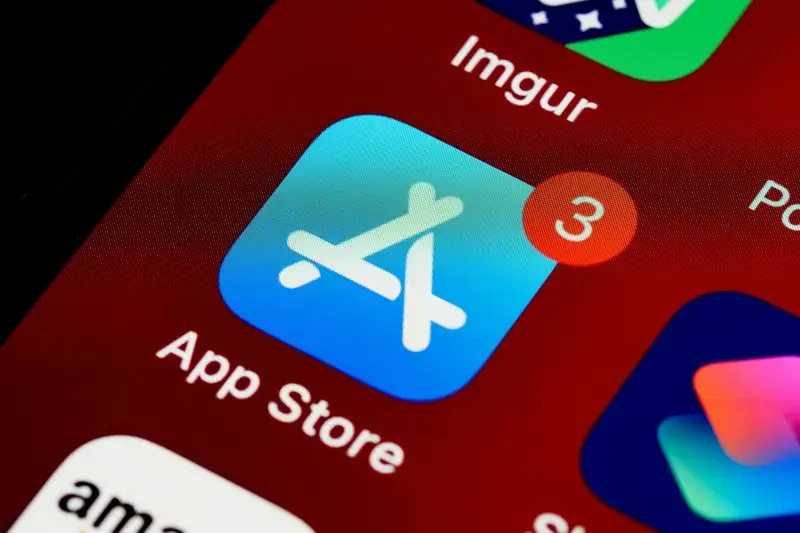How Can I Improve My App Store Ranking?
If you've launched an app and have seen it gain little traction, it may be because people just aren't finding it in the store. Higher rankings mean more visibility, more downloads, and ultimately, more revenue so it's no wonder that it's hot topic.
At Glance, we totally get it. You're dedicating resources, endless creative energy, and hard-earned money into building your app, so, when it doesn't perform as hoped, it feels like a kick in the stomach. Trust us; we've been there. We've helped countless businesses like yours climb the rankings so we're going to share our insight so you can do the same.
Improving your app store ranking isn't just about fancy graphics or witty content—it's a blend of art and science. And yes, a sprinkle of patience.
So, what will you learn today? By the end of this guide, you'll not only understand the fundamentals of App Store Optimisation (ASO) but you'll also have actionable steps to implement right away. Here's what we’re talking about:
- How to craft an irresistible app title and description
- The importance of eye-catching icons and screenshots
- How to research relevant keywords effectively
- Leveraging social media and PR
We promise to make it as easy to understand as possible, no tech jargon here, so let’s get started on demystifying the world of app store rankings and make your app the shining star it deserves to be!
Why Your App Store Ranking Matters
Your app's ranking is not just about bragging rights – although it feels pretty good to be at the top, doesn't it? It directly impacts your app's visibility, which in turn influences its download rates. Think of it this way: if your app isn’t on the first or second page of the App Store search results, it’s hiding away behind a sea of apps, waving a tiny flag no one can see. Potential users are more likely to go for highly-ranked apps because they trust the crowd's wisdom – if everyone else likes it, it must be good, right?
Your ranking also affects your app's credibility. An app that's at the top naturally seems more reliable and more popular that the competition. It's like choosing a restaurant: you’re more inclined to pick one that's buzzing with happy customrs than one that is empty. In the App Store, high rankings and positive reviews serve as happy cutomerts, influencing more people to give your app a try.
Let’s face it, we are all a bit impatient when it comes to searching for apps. Most people won’t scroll endlessly to find what they need, hence, a better ranking means your app is easier to find, leading to more downloads. From a business perspective, those downloads can translate into more customers, more revenue, and for some, world domination (okay, maybe just a boost in business).
And it doesn't stop there. Constantly monitoring and improving your ranking is crucial. If the ranking dips, it’s a red flag indicating you need to check what’s going wrong. Was there a poor update? Are users unhappy? Is the app lagging behind competitors? By keeping an eye on your ranking, you can stay proactive and address issues before they snowball into bigger problems.
So, now that we understand why app store ranking is vital, let’s dive into how you can climb that ranking ladder.
Understanding App Store Optimisation (ASO)
App Store Optimisation, or ASO, is a bit like SEO but for mobile apps. You want your app to actually be seen by people, right? That's where ASO comes in. This process tweaks and enhances various elements of your app's store listing to push it higher in search results, making it more visible to potential users.
Consider this: around 70% of app store visitors use search to find new apps. So, if your app isn’t ranking well for relevant keywords, you’re missing out on a massive chunk of potential users. And let's be honest, no one enjoys scrolling through pages and pages of search results; your app should shine right at the top.
| Ranking Factor | Impact on Ranking |
|---|---|
| App Title and Keywords | High |
| Number of Downloads | High |
| User Ratings and Reviews | Medium |
| App Description | Medium |
| App Icon | Low |
Just like crafting an app in the first place, ASO requires a good mix of creativity and science. You're looking at things like keywords, titles, descriptions, and creative visuals (which we'll talk more about later). It's not just about stuffing in keywords; it's about creating a listing that resonates with your target audience and convinces them to hit that download button.
The benefits? Well, beyond just higher rankings, a well-optimised app listing can also lead to higher conversion rates, meaning more people who see your app will actually download it. Plus, a great ASO strategy can help build organic traffic, reducing your reliance on costly ad campaigns.
So, roll up your sleeves and get ready to dive into the world of ASO. It might seem a tad overwhelming at first, but trust us, it’s worth the effort. After all, you’ve poured your heart and soul into developing your app; getting it noticed is the next big step.
Crafting an Irresistible App Title
Your app's title is essentially its first impression. Just like how a catchy shop name piques curiosity or a clever book title lures readers, your app title has to be both engaging and descriptive. This isn't merely about being creative; it's about balancing creativity with strategy. Using main keywords in your app title can significantly improve your visibility. Think of it this way—if your app helps users manage their finances, make sure words like "budget", "finance", or "expense" are in there. But, don't overdo it—no one likes a title that sounds like a jumble of jargon.
Let's look at another example. Suppose your app helps users track their daily steps and meals. Instead of just naming it "Step Tracker", make it a touch more intriguing and keyword-rich, like "Step & Meal Tracker: Daily Fitness Goals". It's practical, immediately tells the user what the app does, and incorporates relevant keywords.
Avoid stuffing keywords to the point where the title becomes convoluted—balance is key. Remember, the title should resonate with prospective users and solve their need instantly. A clear, relevant, and keyword-optimised title can be a game-changer for your app's ranking. Strive for a title that's both smart and appealing, and don't shy away from tweaking it based on performance data.
Creating an Engaging App Description
When it comes to your app description, think of it as your story’s blurb – it needs to be concise yet compelling. You've got just a few moments to really capture someone's attention, so every word counts. Start with a strong opening that highlights the unique selling points of your app. What makes it stand out in the crowded app marketplace?
Next, delve into the core features and functionalities. Be clear and to the point, making it easy for potential users to understand exactly what they are getting. It's often helpful to use bullet points for this section:
- Key Feature 1 - Explain how it benefits the user
- Key Feature 2 - Showcase what makes this feature amazing
- Key Feature 3 - Highlight the uniqueness of this functionality
Once you’ve got their attention with the features, it’s time to add a touch of emotion. Share a bit about the inspiration behind your app. Maybe it solves a common problem you encountered, or perhaps it’s a passion project developed from user feedback. This helps to build a connection and trust with potential users.
Don't forget to include social proof. Has your app been featured in any notable publications? Boast about it! Have you racked up a tonne of high ratings? Flaunt those stars! Positive ratings and reviews can make a significant difference by providing third-party validation, nudging prospects toward downloading your app.
Lastly, always include a strong call-to-action (CTA). A simple “Download now and transform your experience!” can go a long way. Your ultimate goal is to get users to hit that ‘Download’ button, so make it easy and enticing for them to do so.
The Power of Eye-Catching App Icons
Scrolling through the App Store, what grabs your attention first? That’s right—the app icon. It’s the face of your app and often the first impression users get. You’d be amazed how much a stunning app icon can spark curiosity and drive downloads. Think of your app icon as a mini billboard. It's got to be bold, intuitive, and unique. It needs to tell a user, "Hey, look at me!" without being overly complicated.
So, what makes a successful app icon? Simplicity and clarity are your best friends here. An overly complex icon can be difficult to understand at a glance. Keep it clean and focused on a single motif, for instance, the icons for 'Instagram' or 'Spotify' are instantly recognisable because they keep things straightforward. Your icon also needs to stand out in a sea of other apps, so using vibrant colours or contrasting shades can help catch a passer-by's eye.
Thinking about design is hard, but not thinking about it can be disastrous.Ralph Caplan
But don't just stop at aesthetics. Your app icon should also be representative of what your app does. If it’s a game, let it feel playful. If it’s a finance app, it should give a sense of security and trust. And we can't stress enough the importance of adhering to platform guidelines. Different platforms have different requirements for app icons, so make sure you're following these to avoid any hiccups during submission.
Test your icon with real users. A/B testing can offer valuable insights into which design resonates better. Pay attention to user feedback and be willing to make tweaks; the process doesn’t end once the icon is designed. Continuous improvement based on user interaction and feedback will keep your app looking fresh and engaging.
Optimising Your Screenshots and Videos
Your app screenshots and videos are like a shop window – they need to catch the eye and show what’s on offer in seconds. Just like you wouldn't walk into a shop with dull windows, users won’t click on an app without alluring visuals.
Now, if you're thinking that capturing a handful of random screenshots will do, hold your horses! Those screenshots need to tell a story so show the best parts of your app first. Are you a game? Highlight the exciting moments. A utility app? Demonstrate those life-saving features. Users want to see what’s under the hood, and they’re not sticking around for a slow reveal.
But, let’s not stop at screenshots. Videos can boost your download rates by over 25%! And, guess what? The top 50 apps are all in on this trick.
When creating a preview video, keep it short and snappy. No one has time for a movie – aim for 30 seconds of pure excitement. Don’t cram in every feature. Pick a few, show their magic. Avoid relying too much on audio; not everyone will hit ‘unmute’, and, always end with a call-to-action: invite them to download it!!
Think of your screenshots and video as the frontlines of your marketing – they create the first impression. If you optimise them well you can watch your downloads multiply.
Researching Relevant Keywords
Keywords are the backbone of App Store Optimisation (ASO), and getting them right can feel like striking gold. But how do you find that shiny treasure? Let’s break it down.
First, put yourself in the shoes of your potential user. What words would they use to find an app like yours? These initial keywords form the basis for your research. Simple, right? Tools like Ubersuggest can help you brainstorm and refine these keywords.
Now, consider three crucial factors:
- Search Volume: This tells you how often people are looking for a particular keyword. Aim for keywords with high search volume, but be wary of those with intense competition—it's a tightrope walk.
- Keyword Relevance: Ensure the keywords you choose are directly related to your app's core functionality. It’s tempting to go for popular terms, but if they don't match your app’s purpose, you’ll attract the wrong crowd.
- Competition Level: Gauge how tough it is to rank for a specific keyword. High competition means you’ll need to up your game. Sometimes, targeting slightly less competitive words can yield better results.
Don’t forget to check what your competitors are doing. This isn't about copying their work but rather about understanding the playing field to identify which keywords they rank highly for and see if there are gaps you can fill. Competitor analysis tools can offer insights into these high-performing keywords.
Remember, keyword research is not a one-off task. It's an ongoing journey. Trends shift, users' preferences change, and new competitors emerge. Regularly revisit and tweak your keyword strategy to stay ahead of the curve.
In short, mastering keyword research is a balancing act. By focusing on search volume, relevance, and competition, with a little help from keyword tools and some savvy competitor analysis, you'll be well on your way to improving your app store ranking. It’s a complex puzzle, but when you piece it together, the results can be spectacular.
Leveraging Social Media and PR
Social media isn't just for cute cat videos anymore (although who doesn't love those?!?). When used effectively, it can be a powerhouse for your app's promotion. You want to create buzz and get people talking about your app. Think of platforms like Instagram, X (although I still call it Twitter!), LinkedIn, and Facebook as your modern-day word-of-mouth channels tailored to your target audience.
Here's the deal: By crafting visually appealing and engaging content, you can highlight your app's unique features and show off why it's a must-have. Consider using influencers or micro-influencers who resonate with your brand, as personalised endorsements can make a world of difference. Users trust people more than they trust faceless companies.
But what about those PR stunts and articles? Good question! A well-timed press release can catapult your app into the spotlight. Partner with industry-specific blogs, online magazines, or even tech news websites to get the word out. The goal is to get people excited and talking about your app, and nothing beats a thorough feature in a respected publication for that.
Remember, it's not just about getting eyes on your app but engaging with your audience directly. Respond to comments, share user-generated content, and create community engagement. This interaction helps build a loyal user base and encourages word-of-mouth marketing, which can boost downloads and in turn, your app store ranking.
Lastly, don't forget the power of user reviews. Encourage satisfied users to leave positive reviews on the app store, and if you get a negative review, face it head-on with a prompt and helpful response. Addressing feedback shows that you care about your users and are committed to improving their experience; this human touch can work wonders for your brand's reputation.
In a nutshell, social media and PR are your best friends in the quest for app store dominance. Get creative, stay engaged, and watch your app rise through the ranks!
Conclusion
Boosting your app store ranking isn’t just about tweaking a few settings; it’s about creating an app experience that stands out in every way. From your app title to your icons and from your screenshots to your keywords, every little detail counts. By focusing on App Store Optimisation (ASO), you’re not only enhancing your app’s visibility but also speaking directly to potential users, showing them why your app deserves that precious download.
Remember, consistency is key. Regularly update your app based on user feedback and analytics to keep your users engaged and satisfied. Encourage ratings and reviews – they are the golden ticket for higher rankings. Engage with your audience through social media and PR efforts to spread the word and create a buzz.
If it feels overwhelming, you're not alone, many businesses find this process a bit like juggling flaming swords while riding a unicycle. But by following these steps, you'll not only see an improvement in your app store ranking but also a boost in downloads, user engagement, and ultimately, your ROI.
Every app deserves its moment in the spotlight, and with the right approach, yours will shine brightly.
Share this
Subscribe To Our Learning Centre
You May Also Like
These Related Guides

How Do I Optimise My App for the Apple App Store?

How Do I Get My App Featured in the App Store Rankings?



